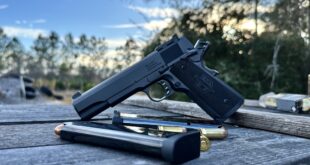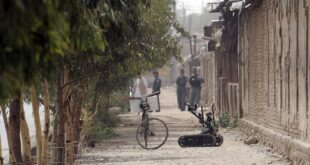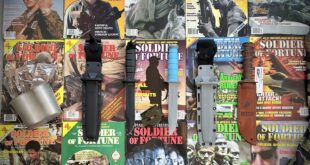By John Spencer
As I sat in a clean, elegant café in downtown Kyiv it was nearly impossible for me to comprehend the story I was being told. My interviewee was a quiet, humble former active-duty Ukrainian Marine from Mariupol named Gennadiy (or Gena for short). But while Gena was soft spoken, something about his demeanor told me this man was a warrior. The more I listened to him tell his story, the more I realized he was not just a warrior – he was a modern-day Rambo with a real story of survival, evasion, resistance, and escape like I had never heard before.
Gena lived in Mariupol. He joined the Ukrainian Army in 2010 after making a choice to either work in the factories of Mariupol or enter military service. He served in the Ukrainian Army to include Airborne forces, and later joined the Marines with the 1st Separate Feodosia Marine Battalion. After leaving the military, Gena worked for various government security forces that he said he could not discuss. He saw combat in multiple places including Mariupol in 2014 when Russian backed forces tried to overtake the city but failed.
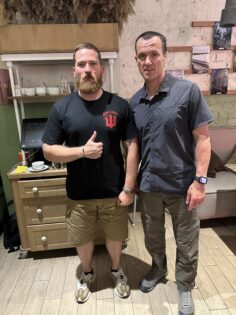
Gena, left, with the author
When Russia launched its full-scale invasion of Ukraine on February 24, 2022, Gena was relaxing at his girlfriend’s apartment. Russia launched multiple simultaneous attacks on cities across Ukraine to include Kyiv, Chernihiv, Sumy, Kharkiv, Kherson, Melitopol, and Mariupol. The start of the invasion in Mariupol was undeniable as bombs and rockets rained down on pre-planned targets across the city. Gena’s girlfriend smiled, surprised by what she thought was celebratory fireworks.
“Those aren’t fireworks, the war has begun,” Gena said, and told her he had to go.
Gena left his girlfriend’s apartment and headed to his own where he had all his military clothing and equipment. But he needed a weapon, so he called a friend he knew could help. Now armed, he made a few more calls and became part of a self-organized small group of volunteers that included a 70-year-old man armed only with a shotgun. Gena became the deputy and later the commander of the group.
Once formed, the group immediately moved to the outskirts of the city to engage the invading Russians. They met a convoy of tanks and mechanized infantry already at the city’s perimeter. Gena and his group engaged the convoy with their RPGs and small arms. It was a successful engagement, but Gena was already worried about the lack of sufficient weapons based on what was already approaching the city.
It only took days for the combat to intensify so much so that Gena remembered fighting a group of Russians in two adjacent houses. The two groups threw grenades at each other yelling, “you surrender;” and the other, “no, you surrender!”
READ MORE from John Spencer, at war in Iraq.
Each day the situation got worse. The bombing of the city seemed to Gena to be 24 hours a day. One of the bombs hit a house Gena and his team were in.
About a week into the full-scale assault on Mariupol, Gena’s group was cut off from the other Ukrainian force fighting in the city. The combat intensified. Members of Gena’s group began to be severely wounded and killed around him.
“At this point I already realized that most likely I will die, but I was scared to be captured.”
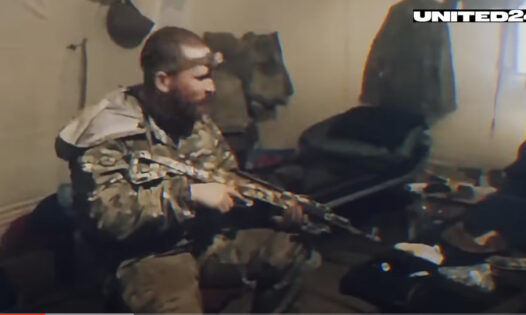
Eventually the volunteer group was reduced to only two men, Gena and one other. Gena believed they needed to get to the Azovstal steel factory where he knew other military forces were. He also knew from growing up in Mariupol that it was the strongest defense position in the city.
Gena and his battle buddy found an abandoned car they were able to start. They formed a plan to drive to the Azovstal. Gena knew there was little chance they could make it but they had to try. The path actually looked open.
On the way, the car hit a mine, killing the teammate and badly wounding Gena and knocking him unconscious. He woke laying in the street not knowing how long he had been out.
He crawled on all fours to the yard of the nearest house just to gain some sense of security. He crawled under the fence, and fell unconscious again. When he awoke, he managed to stand despite overwhelming nausea. He stumbled into the nearby house.
Gena took off his helmet, weapon, equipment, and military clothing and hid it all in the cabinets. He changed into some men’s clothing he found in the house. As he gained more consciousness he realized where he was in the city. He was not far from his own apartment complex.
With no safe way to reach the Azovstal factory, Gena decided to carefully head back to his apartment to decide what to do next. He crawled on all fours many times along the route to evade detection of any possible Russian soldiers he thought might be in the area. Although clearly injured, he joined many of his neighbors in the basement of the building he lived in. He tried to blend in with the other civilians assuming most had no idea that he had previously served in the military or had just returned from fighting the Russian invaders.
Gena asked if there was a bed in the basement. He laid down, still concussed from the explosion. He passed out again. He didn’t know how long he was unconscious. He woke to a neighbor trying to give him a piece of apple. Gena woke enough to look outside, and all he saw was Russian soldiers. The number of Russian soldiers patrolling their neighborhoods seemed to increase daily.
Soon after Gena gained full consciousness, a man came into his basement yelling for help. The man’s apartment had caught fire after the Russians bombed it, and his pregnant wife and children were trapped inside. No one stepped up.
Still somewhat weak, Gena stood.
“I will help,” he said. He saw that the man’s pregnant wife and three- and seven-year-old daughters were trapped inside the burning building. Gena broke through their door, helped them to the street, and then was forced to run back with them avoiding the explosions of even more shelling. They all made it back to Gena’s basement. He felt good about what he accomplished in helping the man save his family. Gena was soaked in sweat, removed his shirt to dry out. It was a fateful decision.
Only a few days later that very man whose family Gena helped rescue turned Gena into the Russians as a suspected Ukrainian soldier. Gena stood with a rifle to his face as the Russian soldier looked at the man asking “this is the guy,” and the man replied “yes, that is him, look at his tattoos.”
The Russian soldier forced Gena to strip. Once he saw his military related tattoos, they began beating him on the spot. The soldiers immediately asked Gena if he was from the Azov regiment. He wasn’t, but he knew to remain quiet either way. The commander of the Russians forces in the area visited the basement and ordered the other soldiers to take Gena to their headquarters.
Gena was moved to a home in Mariupol being used by the Russians as a headquarters. They had also turned the basement into a makeshift prison and torture chamber. Gena was immediately asked more questions. “Where are you from.” But he remained silent.
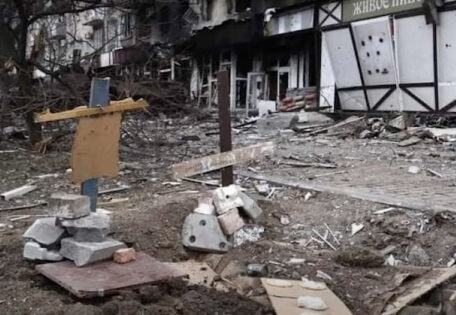
Makeshift graves in the street.
Gena was taped to a radiator in the basement. It was very dark. No lights. He could hear that there were other prisoners in the room with him but he could not see them. Gena was tortured and beaten daily for weeks. Many of Gena’s teeth were kicked in during the beatings.
One day a Russian soldier walked into his room and said “you’ve been sentenced to death.” The soldier pointed to other prisoners in the basement, “you too, you, you, and you.” Gena and the others were taken to an unfinished church nearby and placed in a row side by side on their knees.
“Bam, Bam, Bam.” Gena heard the shots of the rifle killing the men systematically down the line. He was confident he was going to die at that moment.
Two men before Gena, the shooting stopped and he heard the Russians say, “someone will have to clean this mess up.”
A car pulled up, and Gena and the remaining men were required to help stack the executed prisoners in the car. He was then taken back to the basement and re-taped to the radiator. The next day, Gena was subjected to the identical nightmare scenario, but he again survived the execution.
Gena’s psychological torture also included constantly being told the major cities of Ukraine had fallen to Russia. “Kyiv is gone.” “Lviv is gone.” But one day he was brought to the upper level of the house and was told his captors were going to join others to storm the Azovstal factory. He didn’t understand how the major cities of Kyiv and Lviv had fallen but the factory was still unconquered. While he couldn’t be sure, he believed he had been in the basement for three to four weeks. Either way, he was happy to hear Ukrainians were still holding the factory.
The house bustled with all the Russians preparing to leave for the Azovstal factory. At one point he was told he would be dressed in their uniform and forced to walk in front of their assault. The Russians instead tied Gena up more than he had been up to that point. On top of tape, they added ropes to ensure he was strongly secured. They moved him to a corner of a room on the second floor of the house. For many hours all he heard was silence.
Gena decided he would take the moment to try to escape. He was able to remove the tape and ropes with his teeth. He then fell out of a window of the second story floor, landing on the street below like a sack of potatoes. Although he was weak from the beatings and lack of food and water, he managed to get to his feet.
He started to walk down the street away from the house. He got no more than 500 meters away when a lady started pointing and yelled that he was escaping. A civilian man ran up to Gena and began to pull him back to the house he had just escaped. The woman said she would go to tell someone.
Drained of all energy at this point, Gena was dragged back into the house. He believed his escape attempt was over. He begged the man, a skinny younger man he believed was no more than 20-ish, to let him go. The man would not. Gena resisted and somehow was able to escape the young man’s grasp, run through the house and out into the backyard. Gena never looked back and this time stayed in the yards and alleys of the houses rather than any streets.
Gena got far enough to think he was safe from the young man who had grabbed him. He still feared being caught by Russian soldiers on the streets. Gena hid in the basement of one house for a few hours, and then carefully moved to another trying to stay hidden but not stationary. He did not know what to do next. He knew that he would not be able to make it to the Azovstal factory. His face was too bruised and bloody to blend in with other civilians walking around. He had remembered hearing from his neighbors that the left bank of Mariupol was less patrolled and controlled by the less competent DNR (Donestsk Peoples’ Republic).
After a close call with a group of Russian troops in a mechanized convoy, Gena decided to try to get to the left bank of Mariupol.
Gena knew Mariupol. He had lived there most of his life. He planned a route and began his movement. He was surprised at all the civilian dead bodies lying along his route. Many buildings seemingly cut in half by an angry god. There was dead silence in some areas, as if even the bugs had been extinguished. Burned out tanks littered other areas. Gena finally made it to the left bank. He found a section of completely burned out and destroyed buildings he thought would not be patrolled by Russians.
The destroyed building he lived in had no electricity, running water, or heat. Most of the city was left without these essential services. But the ruins of a building Gena selected did have one advantage. It had what he described as “massive” unexploded ordnance or bombs around the building and neighborhood. He believed this kept many of the Russian patrols out of the area. Gena did have to avoid all the drones used by the Russians. He eventually figured out a pattern for when the drones were up in his area and avoided going out during those times.
Gena consciously settled into his new home. He knew he needed to just survive. He dug daily to deepen his basement hideout. He created multiple entrances so that he could get in and out of it as quickly as possible. He found a mattress for a bed and used old rugs as blankets. Constantly working on his basement and gathering anything he could from the environment were part of his mental survival.
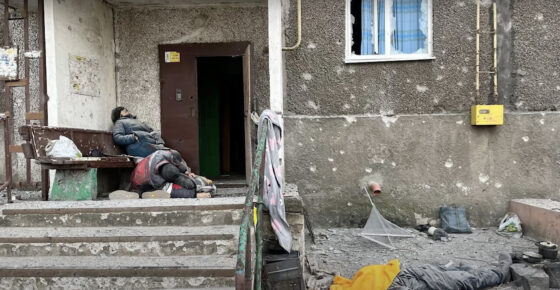
Outside, bodies lay where they fell.
At this point Gena was starving. He found a can of dog food in the rubble of his building. He didn’t eat it for the first four or five days. When the hunger pains got bad enough, he ate it. He drank from puddles of muddy water left from rain. He later used plastic bottles full of sawdust and sand to filter any water he found. He discovered garbage where he could. He found an old bun, and ate only a tiny piece of it a day trying to make it last. He ate pigeons, dogs, and any other animals he could find. He made small fires away from his living area to cook anything dead he needed to eat. But he had to make and extinguish the fire as fast as possible because he feared what smoke the small fires made would give away his position. He did not have the time to boil anything. He laughed that he couldn’t make “three hour pigeon soup.”
One of Gena’s major struggles was that he couldn’t really walk. Something was badly wrong with one of his knees. He could stand with the aid of a make-shift crutch, he could stand but not walk. If Gena really wanted to go out, he had to crawl – and that is what he did. Gena would crawl around at night looking for new supplies or scraps of equipment, just to have something to do.
If he crawled a couple hours one way, he could make it to a nearby landfill that was a few kilometers away. In the landfill Gena found clothes, and expired or rotten food he would see if he could keep down.
Gena slept a lot during the daytime when it was too risky to go out. He did not know how long he would sleep for at a time, but it was a lot. He was tempted to organize or plan an escape to somewhere, but he could not risk getting captured and tortured again. It wasn’t like the movies where you see a civilian and can be saved. He had to stay hidden from civilians at all times.
He reasonably struggled with the thoughts going through his mind. He forbade himself from planning for the future. He set out to survive just one day, over and over.
“You have to sit and wait and hope for the best, that something will one day happen, and this hope gets you through,” he said.
One day, Gena met a Ukrainian girl. She would not get too close, and she would not stay long when she did stop to look at Gena. The sight of her was a massive emotional boost to Gena. She was a connection to something greater outside his world of survival. Initially that emotional support is all she brought. But over time the girl began to leave food for Gena to collect when no one was around.
One day, weeks if not months after the first contact with the Ukrainian girl, a phone appeared in one of the girl’s normal drop spots. Gena had destroyed his phone before he was captured the first time. Gena just stared at the phone for hours. He did not know what to do with it. Who could he call? Who would answer? The phone had a Russian SIM card and when on, it used the Russian cell network – now the only one over Mariupol. What passwords to what account could he even remember? Surprising himself, Gena remembered his Instagram password. It was a platform he never took seriously. It was an added bonus that his account did not require password authentication. He was very scared about who to write. Who could he trust? He looked first for soldiers or marines he had served with in combat.
The friends that Gena reached through Instagram of course had a lot of questions, and asked about his health. Gena answered them slowly, worried about the consequences of letting anyone know where he was. When Gena was sure he could trust his friends and they were sure that it was him, he began to ask if there was anything that could be done to help him. The awareness of Gena’s existence and situation was expanded through military channels.
Gena said proposals from the people he was talking to began to come in – “just give up” or “maybe we can trade for you later.” But Gena did not think he would live through another detention in the shape he was in. He also did not think he would ever be traded. He was not a member of the military, he had no value.
The friends tried to provide moral support. They tried to lighten his mood with dark jokes. He respected those that said “there is nothing we can do.” His hope of anything coming from them was low.
New Years came and went. Gena knew it had passed, and celebrated the holiday by waging war on yet another rat invasion of his basement. The New Year also brought freezing weather. Gena had little to escape the cold. He slept on three mattresses stacked on top of each other. He stuffed used trash bags and newspaper into his clothes. He tried to heat bottles of water, risking the length of his small fires, and then place the bottles of water in his clothing trying to stay warm. He tried to do exercises, but in his weak and wounded state there was little he could do. He tried pseudo push-ups even with his injured leg, but could only do one or two and then wanted to sleep.
One day, Gena’s friends on Instagram reached out and connected him to what he called “a special group of people.” Some of those people being representatives of the Navy who said, “we hear you are a Marine.” They told Gena they knew his situation, and had developed a plan to evacuate him. But they also told him there was only a 1% chance the plan would work.
Gena struggled with the decision to chance the evacuation. He couldn’t sleep while considering it. He asked himself how much longer he could survive like he was. A few years? He was young and knew he wanted to live. Not in a basement surviving day to day like an animal, but to live again in freedom. He decided to give 1% a chance. On February 13, 2023 a mission was executed to evacuate Gena from Mariupol to Ukrainian controlled territory. It was a success.
Gena now lives in Kyiv going through extensive rehabilitation, both physically and mentally. He says he is adapting. He doesn’t yet feel comfortable in a quiet city. He also spends time training Ukrainian military forces in the Kyiv area. When he is around a military veteran, it is easier, but walking and talking among the civilians remains hard. Gena also struggles with understanding that a year passed while he was in survival mode. It is like time stood still for him. He walks into places in Kyiv and for a second wonders why no one is wearing a mask, thinking he is still in COVID protocol times. But slowly he is finding his new normal.
Gena is now a Marine on a new mission. He wants to recover morally, mentally, and physically as fast as he can. He wants to get healthy so that he can serve in the Ukrainian military again if needed.
“We will win, We must win…. I have to be prepared. If you are not prepared things might end badly.”
Gena’s actions during captivity embody many of the lessons taught in militaries around the world. Such as the U.S. military’s various Survival, Evasion, Resistance, and Escape (SERE) schools. His story should inspire generations of soldiers and people in general about the will, ability, and drive to resist and live. Bravo Zulu Gena!
John Spencer is chair of urban warfare studies at the Modern War Institute, codirector of MWI’s Urban Warfare Project, and host of the Urban Warfare Project Podcast. He served twenty-five years as an infantry soldier, which included two combat tours in Iraq. He is the author of the book Connected Soldiers: Life, Leadership, and Social Connections in Modern War and coauthor of Understanding Urban Warfare. He serves on the board of Soldier of Fortune.
This story combines a first-person interview with two other interviews:
How Gena Became a Marine. The Warrior’s Way
Surviving shooting, escaping form captivity and breaking out of occupied Mariupol. Ukrainian Marine
 Soldier of Fortune Magazine The Journal of Professional Adventurers
Soldier of Fortune Magazine The Journal of Professional Adventurers



